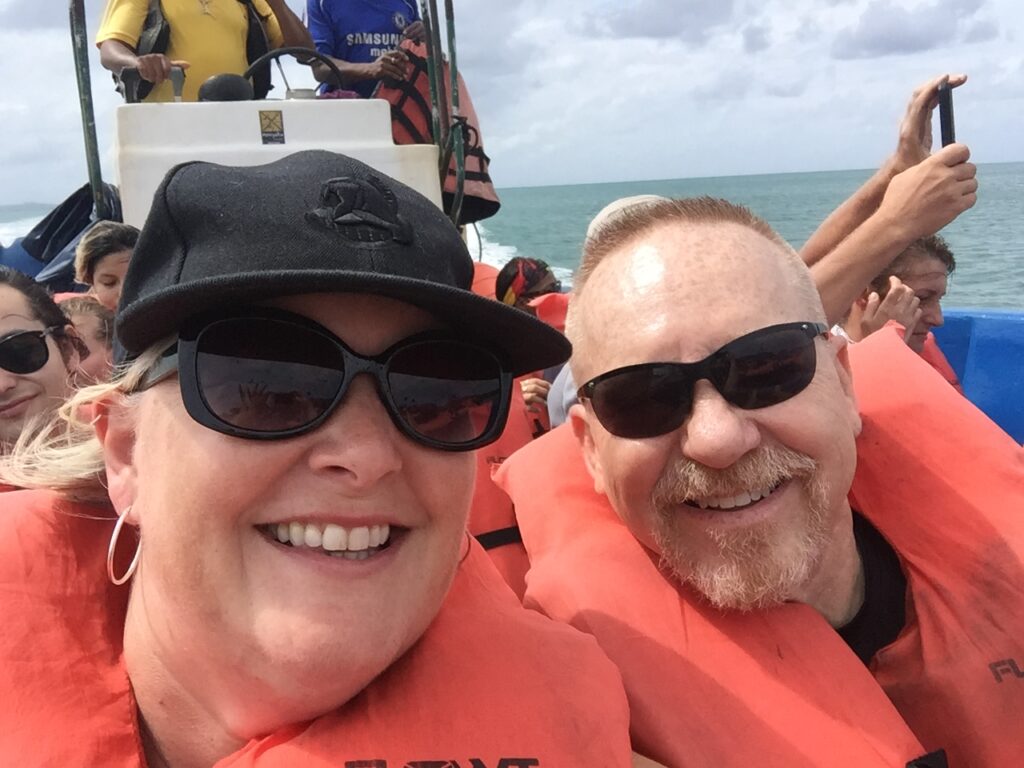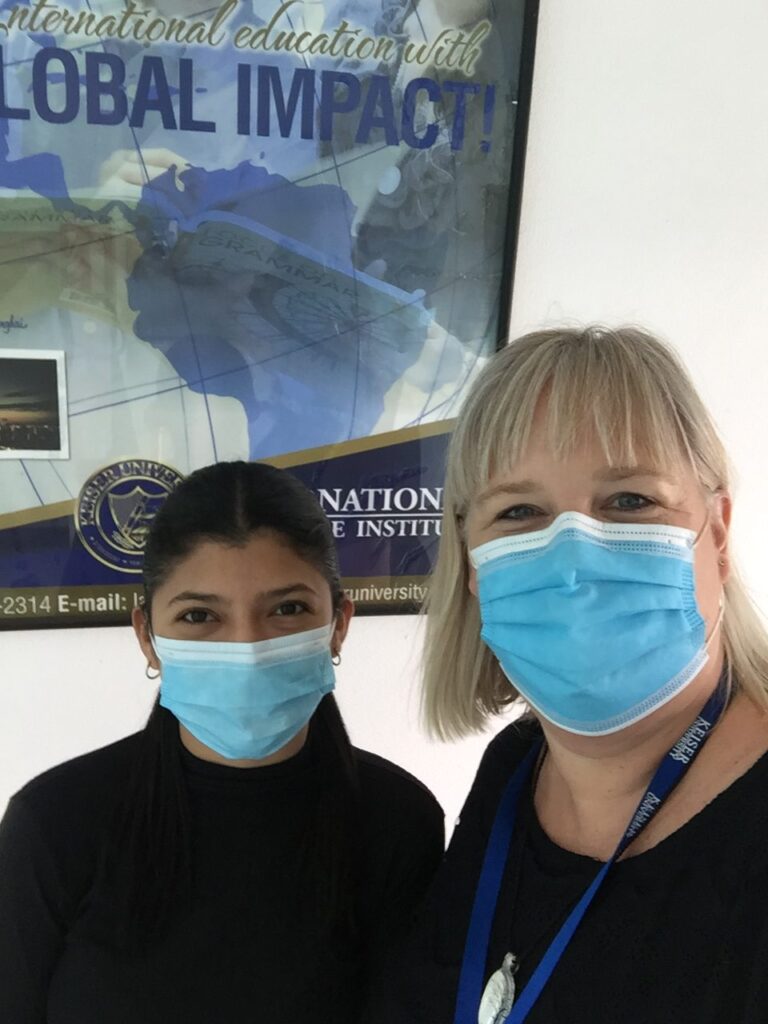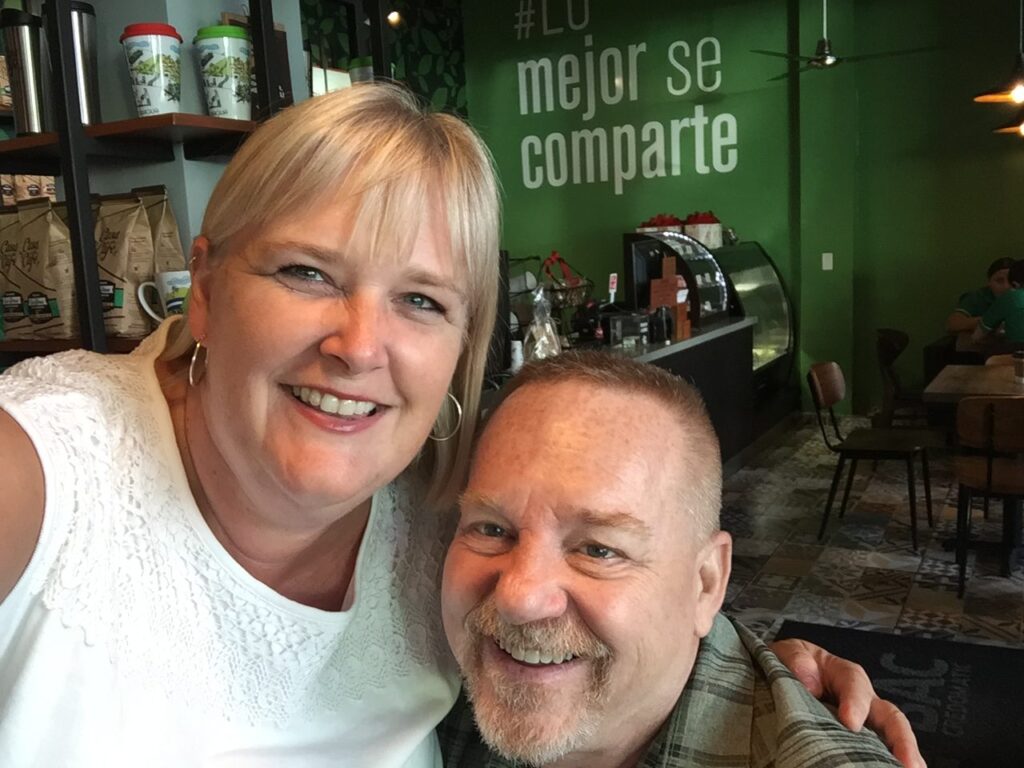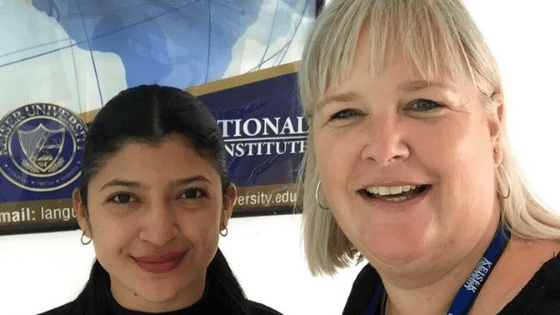Following several years in teaching and administrative roles, including in the U.S. and abroad in Germany, Bridge grad, Natalie Goff, switched gears and moved to Nicaragua with her husband to do missionary work. After several years of service in this Central American country, including informal English tutoring, she decided to fully return to teaching, seizing a position at a university in San Marcos. She details her experience as a professor and her university’s gradual return to onsite classes amidst the global pandemic.
Can you tell us a bit about yourself, Natalie?
I am from Oregon in the United States. I received my B.A. in Elementary Education (K-9) from George Fox University in Newberg, Oregon, and I received my Master’s in Education in Curriculum and Instruction from Concordia University in Portland, Oregon. I have been a teacher for my whole career, although I have taught at different levels and locations.
How did you get into the teaching field?
To be honest, I did not want to be a teacher. People would tell me that I would be great at it, but it just seemed like a lot of work being in charge of a classroom of kids. After investigating several other degrees, I kept coming back to teaching. I think when it is in your heart, you can’t run from it!

Natalie and her husband in one of their trips abroad
Where have you taught English?
I have been teaching English for a total of 14 years. I started my career in Portland, teaching junior high language arts, then worked in Germany teaching junior high language arts in an international/missionary school (Black Forest Academy).
When I returned to the U.S., I taught 5th grade (all subjects) for three years. During this time, I was working on my master’s, and when I completed it, I took the role of dean of faculty at the school, helping our teachers be better teachers.
Seven years ago, I got married and moved with my husband to Nicaragua as independent missionaries. During this time, I taught informally, more as a tutor. Just last year, I started teaching at Keiser University, San Marcos, Nicaragua. This is a branch of the Keiser Universities in Florida.
Find out the job opportunities you could get after completing a Master’s in TESOL.
How did you choose to teach in Nicaragua?
Actually, it found me. After living here for five years and doing what I could to serve people and be a witness for Christ, I was needing something that used my gifts and excited me. A friend asked me if I would ever consider teaching at Keiser University (the next town over from ours), and a light went on. I had never considered it but thought that it would be great if I could get back into teaching.
What is the place you’re currently living in like?
Nicaragua is a very different place than where I am from in the U.S. The weather is in the 80s and 90s all year long, with half the year being wet and rainy and half being dry. We live in a town of about 20,000 people but it feels much smaller than that. Things are much more basic here than in the US. The majority of the country lives in poverty, although they are an easygoing culture that accepts things as they come. The people are friendly, helpful, and like to laugh.
What do you like about teaching in Nicaragua?
The students. Sometimes they drive me crazy because this is a “yes” culture, which means they will tell you what you want to hear, whether it is true or not, but they also have the respect for teachers that I had when I was growing up and had in my early years of teaching. It makes for an enjoyable environment to be a part of!
People here also really want to learn English, so they are motivated to learn. They realize that the skill of English opens doors for them. I also appreciate the environment that I get to teach in. It is a small university community, so there are many opportunities to connect with and be a mentor to students.

Natalie with one of her university students
How did you land your university teaching job? What was the application process like?
After my friend mentioned the job at Keiser University, I put in my application. I brought my resume to the school, then I had an interview with the dean of the university. He presented the job to me and asked if I was interested. Things are more fluid (last minute) here than in the U.S., so after accepting the position in July, I did not hear much for the school until the end of August, when I had orientation with the staff and then started teaching the next week.
Can you tell us more about the university you work for?
Keiser University is unlike other universities here in Nicaragua. Because it is connected with Keiser University in the United States, it is the only school in the country that offers a North American degree –a higher recognition than here. Because of this, young people from all over Central America come to attend, so they have the option of working in the US or other countries. It is a four to five-year degree system and all classes are taught in English.
Who are your students?
My students range from 17 to 23 years of age. They are mostly Nicaraguan, but some are Honduran and some El Salvadorian. The classes I teach are in the SEAL program (Spanish to English Academic Learning), which are 90 level classes for students who do not speak English well enough to enter the school as a regular freshman (all classes are in English). These students have a year-long program to improve their English and be ready for the next year.
What’s your typical workday like?
On Monday, Wednesday, and Friday, I teach from 9 to 11 am, with an afternoon practicum that I oversee Monday and Wednesday from 1 to 2 pm. On Tuesday and Thursday, I teach from 8 to 11 am. My morning classes are divided into listening and speaking and reading and writing. Because I teach both parts, I tend to integrate the themes with the curriculum of the week. The university gives guidelines and I have the freedom of how I want to teach the topics.
What do you like to do when you’re not working?
I like to cook, travel, connect with people, walk my dog, drink coffee, read, and watch movies.
How has the COVID-19 crisis affected you as an English teacher?
Last March, we suddenly went online with much of the world, so I had a steep learning curve of how to make the change. The Internet is not completely reliable here, so much flexibility, creativity, and organization was needed.
This fall, we returned to school with a hybrid of face-to-face and online classes. This has been more difficult than just being online because it requires skills in both areas at the same time. It has not been easy, but is what we need to do for the sake of the students.
How does the hybrid type of learning work at your university?
The hybrid format is that some students are online and some are in the classroom. The challenge as a teacher is to be able to plan lessons that work for both options at the same time. This is something that we have to do because all of the borders around us are closed as well as the airport has not opened to commercial traffic. We have students from Honduras, El Salvador, and the US. As far as the hours online, it is the same number hours as the usual classes.
What measures did your university take for its safe reopening?
How did you feel about returning to the classroom?
I was glad to be returning to class. I did not like teaching just online – it was not personal enough and I did not like being in my house and at the computer. I would rather deal with the challenges of face-to face classes than work completely online. At this point, I connect with my students only online on Fridays, otherwise I teach face-to-face.
You took the Bridge Master TEFL/TESOL Certification course while in Nicaragua. Why did you decide to take this course?
I took the course for two reasons. Since we moved to Nicaragua, I have taught many English classes informally from my home. People really want to learn. I knew I had the learned ability to teach it, but it seemed like a really good idea to acquire some more professional skills and receive certification in TEFL/TESOL.
Additionally, in order to renew my teaching license in Oregon by next November, I need 125 hours of Professional Development. This seemed like a great combination. Due to the isolation and travel restrictions because of COVID-19, it gave a great opportunity to focus on the classes this past May and June.
How has this course helped you professionally?
Much of the teaching part of the course was not new, but it was a good reminder. The skills specifically for ESL were helpful in giving me ideas and theory for my classes this fall. I was also recognized at the university for completing this certification.

Natalie with her husband in Nicaragua
What are your plans for the next weeks or months as the world deals with the global pandemic?
Due to the pandemic, we have been unable to leave Nicaragua. All commercial airlines have suspended flights since April. Additionally, all the land borders have been closed. It has been a challenge because we have not been home for a year and a half. In the next few weeks, we will be finishing up the classes we are teaching (my husband teaches at a seminary) and if all goes well, we will catch a charter type flight to Miami and then make our way to Oregon in mid-December.
How long do you think you’ll stay in Nicaragua?
We do not know how long we will be here, but trust that God will let us know when it is time to return to the U.S. or somewhere else.
Do you have any advice for English teachers who want to work in Nicaragua?
It is not easy to live and work here – heat, bugs, poverty, etc., but it is a great adventure! You never know what you will come across, so if you feel called to do it, come and you will be blessed!










